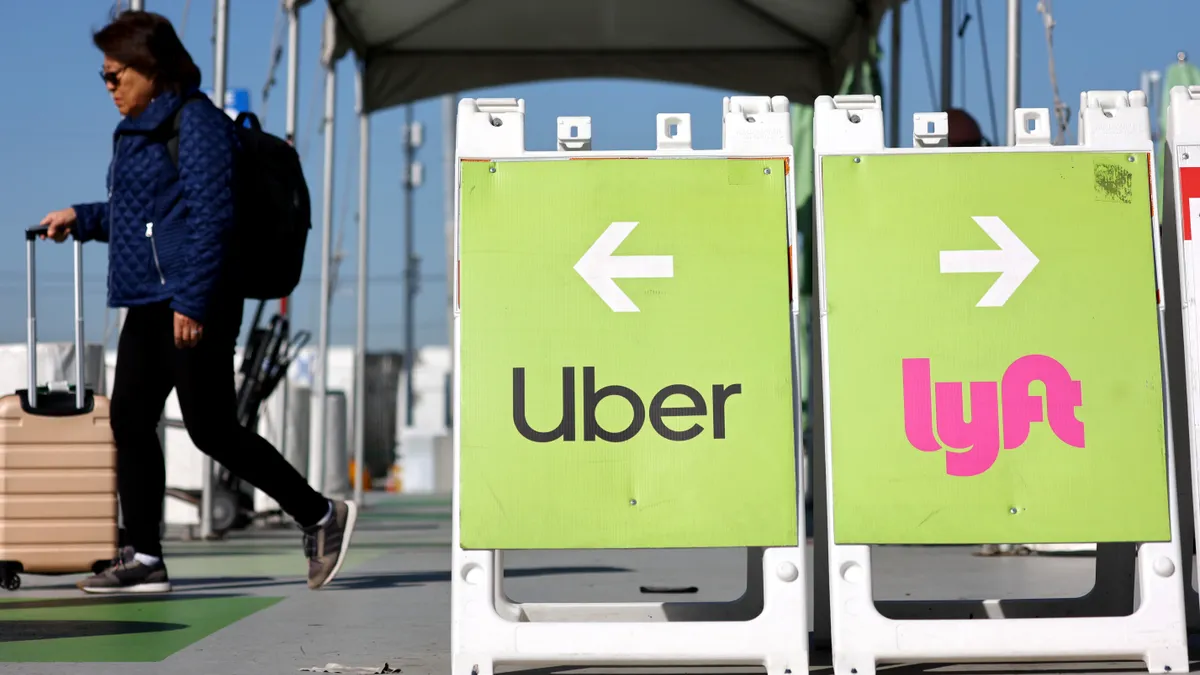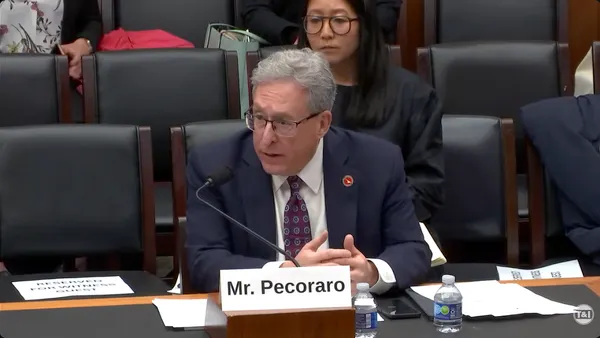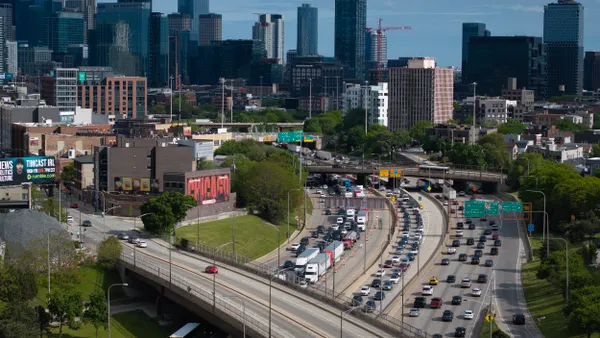Dive Brief:
- Lyft and Uber executives highlighted common themes on their respective earnings calls this week, emblematic of the challenges and changes affecting the ride-hailing industry.
- Both companies reported 20%-plus increases in trips or rides in the quarter year over year, which they partially attributed to return-to-office policies. Their leaders also see autonomous vehicles as a promising technology, however, Lyft CEO David Risher cautioned that the technology is expensive and complex to operate in a ride-hail scenario.
- Uber CEO Dara Khosrowshahi also weighed in on local minimum wage laws, which he said are hurting drivers’ income, while Lyft president Kristin Sverchek voiced her support for a Massachusetts ballot measure that would define drivers as independent contractors.
Dive Insight:
Uber reported trips grew 21% in the quarter year over year, reaching a global average of 28 million trips per day, including taxis, rides and delivery. While the company doesn’t break out data for the U.S., CEO Dara Khosrowshahi noted the company’s 26% growth in mobility gross bookings year over year on the May 8 earnings call and said, “These are very, very high growth rates, and the U.S. is our largest market in terms of gross bookings. So we wouldn't be able to grow at these rates, so to speak, without the U.S. growth being very, very healthy.”
Khosrowshahi said, “We see the weekday commute use case being particularly strong as people are coming back to work.” Lyft also reported a healthy quarter, with rides up 23% year over year and strong growth in Canada. CEO David Risher said on the company’s May 7 earnings call that they “see more bosses trying to get their employees to come back to work.”
Autonomous vehicles
Despite federal and state investigations into Cruise robotaxi operations in San Francisco and Waymo’s need to update its autonomous driving software following a collision in Phoenix, Uber recently expanded its relationship with Waymo to include autonomous deliveries on Uber Eats, Khosrowshahi said.
The Uber CEO gave his perspective on robotaxis. “We think that the AV technology at maturity is going to be very good for the industry,” he said. Khosrowshahi said autonomous vehicles could lower prices, provide safer rides and make ride-hailing available to more consumers.
However, he cautioned that a full shift to AVs won’t happen soon. “We think that the technology is going to take a lot of time to develop. Obviously, there has to be regulatory framework to put in place.” He also foresees a “transition period” with both human drivers and autonomous vehicles operating as well.
“Autonomous cars are definitely coming,” Risher said, adding that it is very expensive to build an autonomous vehicle.
He went on to explain the costs of operating AVs and the costs of having them on the rideshare network. “In the Lyft business model, of course, we don't typically own the car … Drivers own their own car, which is great. It means it's very capital-efficient for us. We can put 2 million rides on the road every day and not effectively own a single car asset … It means we don't have to spend hundreds of million dollars in depreciating assets called cars.”
Minimum wage laws and driver classification
Minimum wage laws for gig-worker delivery drivers in New York City and Seattle had an adverse effect on drivers, said Khosrowshahi. “In Seattle, which is a relatively small market, we saw delivery order volumes decreasing by 45%, which has resulted in courier wait time actually increasing 50% on a year-on-year basis.”
Khosrowshahi added, “Couriers may be making more per order, but they're getting a lot less orders, which has resulted in 30% of active couriers actually leaving the platform, which I think is certainly not what the city council had in mind.”
The Seattle City Council is now considering changes to the wage law, according to USA Today. “Couriers in New York City who want to work, couriers in Seattle who want to work, they're getting hit hard by these regulations, and we're hoping that … regulators see the right path going forward because, so far, regulation has definitely hurt the people that it's supposed to protect,” Khosrowshahi said.
In Minneapolis, the city council passed an ordinance in March — over the veto of the city’s mayor — to set a minimum pay of $1.40 per mile and 51 cents per minute for rideshare drivers. Uber and Lyft reacted by threatening to cease operations in the city. Lyft President Kristin Sverchek reiterated that stance on the earnings call: “In Minnesota, we're working closely with city officials and state officials to find a solution. We're optimistic that we'll be able to do this. If we can't do this, we will be forced to stop offering rideshare services on July 1.”
Also of concern to the rideshare companies are competing ballot measures in Massachusetts that could define drivers as independent contractors, which the companies favor, or allow them to unionize, supported by the local chapter of the Service Employees International Union.
Sverchek said, “We really want to focus on drivers voices being heard and supporting drivers' voices who tell us that they prefer independence and flexibility to traditional employment.”












